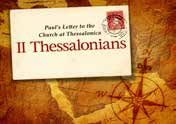Another look at Prophecy and the End of the World
It is not good to be uninformed about the future. There is a place for eschatology as we are not given to be completely ignorant of the future, and the prophecies of the Bible are given to us to know that there are events, and conditions, that are predestined to occur. This however does not give us license to promote speculations regarding our Lord’s coming. Prophecy is not the only answer for preparedness for the time of the end, as we will discuss shortly.

As for the sum of all prophecy pertaining and leading up to the Lord’s return goes, it will be limited, as all prophecy concerning the end of this age collapses to a single reality and that is that the Day of the Lord will come about when we least expect it:
Watch therefore, for you do not know what hour your Lord is coming (Matthew 24:42).
In fact, it will be at a time we least expect.
Therefore, you also be ready, for the Son of Man is coming at an hour you do not expect (Matthew 24:44).
But take heed to yourselves, lest your hearts be weighed down with the carousing, drunkenness, and cares of this life, and that Day come on you unexpectedly. For it will come as a snare on all those who dwell on the face of the whole earth. Watch therefore, and pray always that you may be counted worthy to escape all these things that will come to pass, and to stand before the Son of Man (Luke 21:34-36).
There are some key points to consider regarding the Lord’s warning:
- Most SVM readers and contributors may not be carousing drunkards, but some may very well be weighed heavily by the cares of this life
- It will come as a snare upon all who dwell on the earth, both believers and non-believers, just and unjust.
- Lastly, the prayer of being counted worthy is not a selfish one, or one of fear, or of escapism. It is a prayer to have strength, and those kinds of prayers are aligned with God’s will and purpose. Those who are aligned with God’s will are those who will be counted worthy, or have the worthiness to see their salvation through to the end.
But concerning the times and the seasons, brethren, you have no need that I should write to you. For you yourselves know perfectly that the day of the Lord so comes as a thief in the night (1 Thessalonians 5:2).Paul re-iterated the same understanding to the Thessalonians. We know for certain the time is coming, but we don’t know the hour.
This article is about what we may be able to garner from the letters from Paul to the Thessalonians regarding the day of the Lord, and what conditions might precede some of the prophetic events described in these letters. In doing so we can use these scriptures as a mirror to consider our own faith, that, though it may be challenged, our calling is to remain children of the light.
Partial Information, but Enough
In both epistles Paul alludes to prior teachings regarding the end times and the day of the Lord, so we are not privy to all of the details to the extent that he had shared. We can however with reasonable assumptions with history and human behavior as our guide and background, put certain pieces together that would be advisable to understand considering the current world economic and socioeconomic systems that are developing.
Let no one deceive you by any means; for that Day will not come unless the falling away comes first, and the man of sin is revealed, the son of perdition, who opposes and exalts himself above all that is called God or that is worshipped, so that he sits as God in the temple of God, showing himself that he is God (2 Thessalonians 2:3, 4).
In writing to the Thessalonians, the apostle Paul brings up the topic of a man of sin, and a falling away that is to occur prior to the Lord’s return. Chapter 2 has been the subject of much speculation, particularly surrounding the `man of sin’ where there are a number of divergent opinions to the future identity of this individual. Let’s take a closer look from that point of view that should matter most to us.
The falling away has often been referred to as an apostasy within the Church of God; that believers would, in significant number, leave the Church or rebel in the form of lawless behavior. This view is not supported by the context of this verse or the letters to the Thessalonians as a whole. While apostasy, or falling away, can refer to leaving the true faith, it is not at all restricted to that meaning.
Paul does not specifically mention the Church either. Paul’s intent is to comfort his readers. (1 Thessalonians 4:18, 2 Thessalonians 2:17) To promise them future loss of brethren (before the hope of Christ’s return) would be contrary to his intentions. This is a worldwide retreat from moral and ethical standards, perhaps anarchy. Moral and ethical standards still exist in the consciousness of the majority of mankind despite common observations to the contrary. What Paul describes to Timothy in II Timothy 3, a self-seeking world: proud, disobedient to authority, unthankful, without self-control, brutal, and despisers of good. Admittedly, this is already manifest in today’s society, but the suggestion we get from verse 7 and 8 is that there is a restraining influence against this mystery of lawlessness that is clearly already at work.
What we need to consider however is that the apostasy that lies ahead is not of a single nation, it is a worldwide phenomenon. Many financial experts believe that our greatest near-term risk of social anarchy will be brought on by economic collapse. We have witnessed localized rebellious behavior when services are disrupted. Huge amounts of money that could be going to providing essential services and stimulating the economy are now going to service a massive debt. This is currently being witnessed in Greece, Spain and Portugal. When the economy of a nation collapses, almost everything changes.
The reality is that we live in a global economy. The debt of nations can substantially impact neighboring and overseas nations.
At its core, it will not be about money or standard of living, it will be about security. When a nation’s security is threatened, immediate and short-term resolutions are taken, and without regard to long term consequences. The Biblical History of Israel, and modern history, show what appears to be the default mechanisms for a nation’s population.
The Need for a Savior
When it all falls apart, when a society is under threat, it immediately looks for a solution. Brutal dictatorships often appear on the scene by being the deceptive solution to a current problem that faces a nation. In fear and needing protection, democratic societies will give up their freedoms and hand power over to a single charismatic individual or political movement who promises to take care of them. Adolf Hitler’s rise to power is a classic example. His message was to be the savior of the people, and built a cult surrounding himself. It is not until it is too late that the true nature and intentions of a ruler are revealed, and if history teaches us anything, so will it be with this man of sin.
The prophet Daniel spoke of such a person. He will make a covenant with the Jews but then break it after three and a half years (Daniel 9:27). The breaking of that covenant seems to be the event that unmasks this individual for who he is, the opponent of Christ.
He will eventually seek to make everyone worship himself and will claim to be God (Revelation 13:5-8). His authority will be fueled by the deceptive signs and lying wonders. Those who are deceived by this cult of personality which turns God, or rather God’s character, into the enemy, now have a new counterfeit god.
But before he is revealed, he will bring what the people want: security and prosperity, they will exalt him with gratitude (Revelation 13:4). He perhaps is the one who brings “Peace and Safety!” (1 Thessalonians 4:3). He is the world’s savior, albeit a deceptive one.
Scripture suggests he attacks all religions, as he exalts himself above all that is called God, or is worshipped, claiming that he is God (verse 4). The Church of God will be a target of this rebellion because they are the people of the true God and represent God’s will on earth, which is extremely unpopular for the climate of this time (Daniel 12:7).
Matthew 24:9-13 describes a Church persecuted; brethren betraying one another and the love of many brethren growing cold. The apostasy will negatively affect the people of God.
The scriptures speak of end time conditions with a world largely under the sway of the man of sin, but it is not a world without God’s call to repent. Verse 10 suggests that the truth of God will be made available, as many other scriptures in the Bible, but not received by many that they may be saved. God will pour out His Spirit in the last days (Joel 2:28), but despite this, many will reject His salvation as described in verses 11 and 12.
Should we care about the identity of this man of sin? By no means is the salvation of an individual attached to the correct identification of the man of sin, or understanding end time prophecy in general. We also see Paul did not hold the whereabouts or identity of the man of sin in high importance. Paul states that this individual will be revealed `in his own time’ (verse 6) so we are not to be concerned if we do not know his identity or timing. Paul’s conclusion is also notable; he does not seem to complete his discussion on the matter, but diverts his readers away from the topic and expresses gratitude for the Church in Thessalonica (verse 13). One can sense his reluctance to worry his brethren with the subject, so neither should we. Nevertheless, we are aware of this eventual occurrence as God does not leave his servants completely unaware of what will unfold (Revelation 1:1)
In Matthew 24, Jesus Christ describes the signs and conditions that will have a sorrowful effect on the people of God and the world at large. Only the elect would be able to discern between good and evil (Matthew 24:24). In fact, the pressures on believers will become so great that for the elect’s sake the times will be cut short, for their faith would surely fail (Matthew 24:22). The lesson of Matthew 24 is to be prepared and to make use of our time and to do His will (Matthew 24:14-30).
A Lesson from the Thessalonians for Us
Prophetic truth is a vital part of the whole counsel of God that is needed for victorious living. It is essential however that, as with all scripture, it be used for proper edification. Paul used it effectively with his audience to reassure and comfort; to protect them from needless distraction. Their readiness for the future is to be sons of light and sons of the day (1 Thessalonians 5:5). See also Faith to Face the Future— SVM 2011 Spring/Summer edition.
If there is something to communicate in this article it is this:
We will be tested throughout our lifetime of faith, and it may well be that the test will become severe as this age closes out, and prophetic understanding will not fully prepare us for it but it gives us forewarning. It is only by the power of God we are preserved, and faith evokes the power of God. Prophecy gives us hope and the ability to identify things for what they are as they unfold.
The Thessalonians were worried that the day of the Lord had come, and they had somehow missed it. They were anxious about mixed messages they had received by some means (2 Thessalonians 2:2). Is there a lesson for God’s people today in these verses?
It is not the first time or the last that predictions on the timing of the Day of the Lord have been in error. The real challenge in making predictions we are not called to make is the distraction, and this was experienced in Thessalonica.
“False starts have been a common phenomenon among movements predicting the imminent end of the age as people’s expectations exceed their patience” — Charles A. Wanamaker
Why were they concerned? Was it lack of Knowledge? That does not appear to be the case:
But concerning the times and seasons, brethren, you have no need that I should write you.
Maybe they forgot:
Do you not remember that when I was still with you I told you these things? (2 Thessalonians 2:5).
Perhaps they did forget, and that is a problem sometimes with knowledge, we forget, particularly during times of stress, or what we know does not manifest itself as we might have expected, or hoped.
Perhaps they lacked faith, but that suggestion would not be consistent with Paul’s words about them:
For from you the word of the Lord has sounded forth, not only in Macedonia and Achaia, but also in every place. Your faith toward God has gone out, so that we do not need to say anything (1 Thessalonians 1:8).
And
We are bound to thank God always for you, brethren, as it is fitting, because your faith grows exceedingly, and the love of every one of you all abounds toward each other, so that we ourselves boast of you amongst the churches of God for your patience and faith in all your persecutions and tribulations that you endure …(2 Thessalonians 1:3,4).
We cannot be sure, as we were not there. But there is a certain reality we must face at the end of the day regarding our limitations regarding knowledge and even faith.
Our faith is not going to be 100% all the time, and that is a reality. Even great icons of faith in the past, now and in the future may find that their faith falls apart, and indeed it will. We do not know what God is doing much of the time, and even if we did I am not sure if that would make a big difference. Jesus is again our true Savior, He saved you before, and He will save you again. Even when faith fails, we can see His intervention again and again, and He will indeed intervene again (Matthew 24:22).
Love only never fails (1 Corinthians 13:8); indeed, God is love. It is greater than faith for that reason.
Paul’s expectation of the Thessalonians was not to know with accuracy the future, but to fulfill the expectations of God:
Therefore we also pray always for you that our God would count you worthy of this calling, and fulfill all the good pleasure of His goodness and the work of faith with power, that the name of our Lord Jesus Christ may be glorified in you, and you in Him, according to the grace of our God and the Lord Jesus Christ (2 Thessalonians 1:11, 12).
The Thessalonians may have stumbled on the matter of prophecy, and we have benefited in part from that, but the weight of the glory of God coming to fruition in them was of greater emphasis.
Our calling is not to know the future, for the future will come and go. The greatest revealed truth is to know the glory of God. So let’s keep prophecy in proper perspective and use it to our best advantage.





